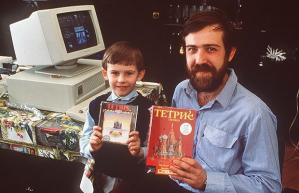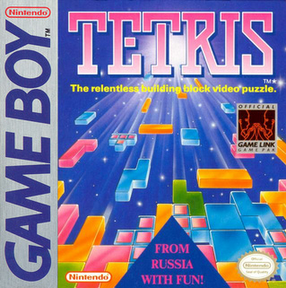Philadelphians were treated Saturday to the biggest game of Tetris the world has ever seen. It was played on two sides of a 29-story building in honor of Philly Tech Week. Henk Rogers, who brought Alexey Pajitnov’s game to the West more than three decades ago, was on hand to witness the spectacle.
The event was one of a number of celebrations happening this year in honor of the 30th anniversary of Tetris, which Pajitnov created in the former Soviet Union in 1984. Rogers made the trek to Moscow to meet Pajitnov and get the rights to publish the puzzler in the rest of the world. Rogers licensed the game to Nintendo, and by 1989, people had bought more than 35 million copies.
But mobile has turned out to Tetris’s biggest platform of all, with more than 425 million paid downloads to date.
We caught up with Rogers for an interview last week. Here’s an edited transcript of our interview.
GamesBeat: What did you think about that building installation when you heard of that?
Henk Rogers: It’s great. I’ve been playing around with the giant Tetris at Burning Man for the last seven years. This is going to be humongous, an order of magnitude bigger.
GamesBeat: It’d be nice if there were a way to make some money off that, but for now it seems like a neat exhibition.
Rogers: Well, PR is money.
GamesBeat: True. What have you been up to lately? Do you have any updates on Tetris and the kind of reach it’s found over the years?
Rogers: We have 425 million total paid mobile downloads. That’s all just on mobile. We had 35 million on the original Game Boy. Boxed products, I think altogether we sold something like 70 million.
GamesBeat: How much of that is really recent? It sounds like a lot of it would be on smartphones?
Rogers: It’s really spread over the whole period where phones have become able to play games. That first happened in Japan. Then it sprang up in the U.S. and Korea and other places. That’s a total number over the last 14 years or so.
GamesBeat: I’d imagine that’s accelerated, though. Do people still want to play it on smartphones and tablets?
Rogers: Yeah. We’ve had to change the game. The original game was controlled with a keyboard, and now it’s a touchscreen game. That fundamentally changes some things. But it’s still doing fine.
GamesBeat: Do you still only sell it as a premium download, or have you made the leap to free-to-play in any way?
Rogers: Yeah, we have made that jump. That 425 million number doesn’t count free-to-play. We have Tetris Blitz now. Electronic Arts secured the mobile rights and decided to do a product that’s similar to their Bejeweled Blitz, a free, item-based game. That’s another level on top of the 425 million paid downloads.
GamesBeat: So Tetris is still holding its own, basically. Why do you think that is?
Rogers: Tetris reaches a basic pleasure center that people have, I think. It lets you create order out of chaos. The game is very random. The same thing never quite happens twice, so your brain has to be making decisions all the time. People like being able to make decisions instead of just doing things according to rote memory.
GamesBeat: It seems like there’s been a big comeback for 8-bit graphics, the old Nintendo-style look.
Rogers: Yeah, that’s possible. There’s a bit of nostalgia out there, and for the younger generation, it’s something that they haven’t seen. They play all these high-res 3D shoot-‘em-ups, and the style there is kind of overkill. If you just want to play the game, these graphics don’t get in the way.
GamesBeat: How do people hear about the game these days? Is it just word of mouth?
Rogers: I wouldn’t say word of mouth. It’s word of hand. What happens is, someone looks over your shoulder and says, “What are you doing?” And you pass the phone over and give them a shot at it. Then they want it on their phone. It’s never just somebody describing the game. It’s always somebody playing the game and someone else watching them. It’s a very interesting principle, this word of hand.
GamesBeat: Has the game changed much? Have the multiplayer versions caught on?
Rogers: We’ve gone in every possible direction, but whenever we make a new version, we always come back to the basic Tetris formula. The basic Tetris has been proved over time. The rotations have become a little more clear. The button presses have become more standardized. We’ve standardized a number of things like that compared to the old days. But we’re not fixing what isn’t broken.
 GamesBeat: How much are you keeping up with what goes on in the mobile game industry? Do you read all the headlines?
GamesBeat: How much are you keeping up with what goes on in the mobile game industry? Do you read all the headlines?
Rogers: Me? No. I kind of retired from the business last December, and I’d already had one foot in the grave for a long time. I have a lot of other missions in life that I’m working on. I’m part of an organization called the Blue Planet Foundation. I’m the chairman of an organization called PISCES – Pacific International Space Center for Exploration Systems. We’re working to bring the space exploration business to Hawaii. We have a group of members practicing for the possibility of living on Mars.
GamesBeat: How are those projects progressing?
Rogers: Oh, they’re doing great. At Blue Planet, that’s been around for eight years now. We’ve passed all kinds of legislation. We’ve reduced the amount of oil that’s being imported for electricity.
GamesBeat: I’m curious about what you think about the modern game industry and the things that are becoming popular these days, like Clash of Clans or Angry Birds.
Rogers: I have a hard time with the freemium model. I’m sort of old-school that way. You could spend a couple of million dollars and build a great product in the old days, and then you’d know that a certain number of them would be sold. Nowadays, you have to build the game and then hope you can keep nickel-and-dime-ing people afterward. You have to interrupt the experience asking for money, and I think it takes away from the game.
GamesBeat: A statistic out there says something like 93 percent of revenue is coming from free-to-play now.
Rogers: Which is why my daughter is running the company and not me.
 GamesBeat: But it also seems like something people might be getting a little tired of.
GamesBeat: But it also seems like something people might be getting a little tired of.
Rogers: They could be. I hope so. I was talking to my driver today, and he couldn’t get around the idea of having to pay to play Tetris. What’s wrong with paying a little money? People won’t spend the amount of money they’d spend on a cup of coffee for a game that could last them weeks. The value proposition’s gotten all screwed up. People expect something for nothing.
GamesBeat: I always felt like buying the Nintendo cartridge was better than putting quarters into the arcade machine.
Rogers: It depends on how much you can get out of the game, I guess. Certainly, I wasted a huge amount of money on Space Invaders and Galaxian. Soon enough I decided I wasn’t going to do that anymore.
GamesBeat: What do you think about where Nintendo is right now and what kind of shape it’s in? What do you think they need to do?
Rogers: It’s funny, I was in Japan recently and I met Mr. Miyamoto. I hate to say it, though, but I didn’t really know what the situation with Nintendo was like. I just wanted to see Miyamoto. It seems like they need to come around to what the rest of the industry’s doing. They’ve always plotted their own course. Yamauchi’s no longer around to plot that course.
It would be nice to see them gain some momentum again. They certainly have the money. I think they know the younger market better than a lot of other companies do. That’s always going to be a market. My granddaughter’s five years old, and she’s getting to the age where she has a Nintendo Wii. She loves it.
GamesBeat: They just need more Tetris on their machines, right?
Rogers: Wherever there’s a screen and a keyboard or a touchpad, Tetris can go there. We’re going to try to make sure of that.
GamesBeat: Did Alexey also make it out there with you?
Rogers: No, he couldn’t make it. He’s in Moscow right now, so it’s more difficult for him to get there than me. Japan’s not a very long way from Hawaii.
GamesBeat: Is there any particular message you’re going to pass along to the crowd out there in Philadelphia?
Rogers: Yeah — Tetris is here to stay. Welcome to the 30th anniversary of Tetris. We’ll be looking for a number of new products. We’ll be celebrating at E3. Alexey is going to be there, too.
VentureBeat's mission is to be a digital town square for technical decision-makers to gain knowledge about transformative enterprise technology and transact. Learn More




